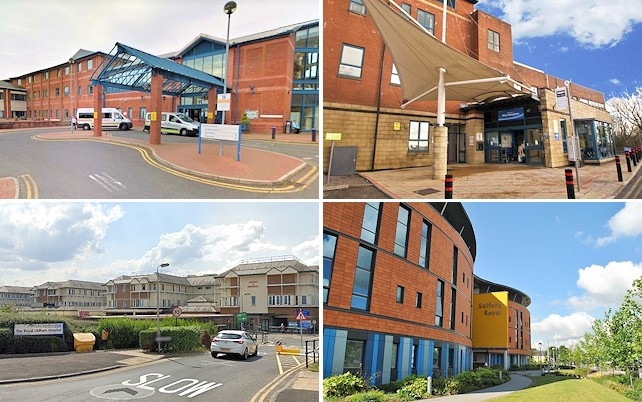Junior doctors to strike over Christmas
Date published: 08 December 2023

Northern Care Alliance hospitals: Rochdale Infirmary, Fairfield General Hospital, the Royal Oldham Hospital, Salford Royal Hospital
Junior doctors will be staging the longest consecutive strike in NHS history during one of the most challenging periods of the year.
Announced this week, there will be a three-day walkout from 7am on Wednesday 20 December, followed by a six-day strike from 7am on Wednesday 3 January.
The British Medical Association says the government “was unable to present a credible offer on pay” despite ‘more constructive’ talks.
Members of the junior doctors committee voted unanimously for further strikes after five weeks of walks with government did not produce a breakthrough.
It says that “if a credible offer can be presented the day before, or even during any action, these strikes can be cancelled.”
The Northern Care Alliance, which runs local medical establishments, has advised Any patient or service user whose appointment is affected by industrial action will be contacted directly.
More information about the planned strikes is available on the Northern Care Alliance website.
Mark Fisher, chief executive of NHS Greater Manchester, said the NHS will “do our best to minimise disruption.”
He added: “Our priorities will be ensuring patient safety and making sure people know how and where to get care and support from during strikes.”
Additionally, NHS organisations in the North West have appealed to people to use health services wisely as new figures show winter virus cases are "creeping up" alongside pressure on emergency departments.
New NHS data published on 7 December shows an average of 234 people were in hospital with flu every day last week, up 53% on the week before.
Hospital norovirus cases continue to rise across the country, with hospital cases up 15% on the previous week to an average 406 people each day - a 28% increase on the same week last year. An average of 92 beds were closed each day last week and unable to be used due to measures to stop the spread of norovirus to other patients.
RSV cases are also increasing, with data showing in the week to 3 December that an average of 146 children were in hospital each day with the virus, up 11% on both last year and the previous week (131).
Dr Peter Williams, Medical Director, Mersey and West Lancashire Teaching Hospitals NHS Trust: “As with all other hospitals across the country, we are experiencing extremely high demand for our emergency care services, and with the recent cold spell, there is significant pressure on A&E departments.
"Infection rates in the local community for illnesses such as diarrhoea and vomiting are on the rise, with winter respiratory viruses including flu and Covid infections also remaining prevalent.
“Inevitably, the increase in people seeking healthcare puts pressure on our hospitals and causes delays for those attending or requiring admission through Emergency Departments. We ask anyone who feels they need urgent care to consider the best service for their needs - local Urgent Treatment Centres have expert clinicians that can treat a range of conditions, and local pharmacies are open seven days a week to offer advice and over the counter medications. Please only use A&E if it is a serious or life-threatening emergency.”
A North West Ambulance spokesperson said: “We are seeing fewer calls than this time last year, however, those we are receiving are from patients with acute conditions. These patients do require an urgent ambulance response and hospital attendance and treatment.
“We would like to ask patients to continue to use the 999 number for emergencies only so we can ensure those in urgent need get a timely ambulance response and for other health concerns, to use NHS 111 online or to call 111 for children under five years.”
The NHS started planning for winter earlier than ever before, including the rollout of care ‘traffic control’ centres, extra ambulances and beds, and the rapid expansion of the world-leading virtual wards programme, helping keep patients out of hospitals and treating more people at home and in the community.
In the North West, there are 23 care transfer hubs, which bring together partners from the NHS, social care, housing and voluntary services to find the best and quickest discharge options for patients.
Virtual wards are helping people to stay in the place they call home, with 1,300 virtual ward ‘beds’ across the region that provide hospital-quality care for patients with frailty, acute respiratory infections, chronic obstructive pulmonary disease (COPD), heart failure and several paediatric conditions.
And North West Ambulance service has recruited new emergency paramedics and call handlers for the 111 and 999 services.
As a result of robust winter planning, there are more beds available nationally, with an average of 100,903 general and acute beds open each day, up almost 1,400 from 99,508 last year.
There are currently 1,200 more patients in hospital compared to the same week last year – with 90,341 adult beds occupied last week, up from 89,125 the year before.
Do you have a story for us?
Let us know by emailing news@rochdaleonline.co.uk
All contact will be treated in confidence.
Most Viewed News Stories
- 1Trio jailed for 20 years after shotgun fired at Rochdale house in broad daylight
- 2First-ever Workers’ Party councillors elected to Rochdale Borough Council; Labour retains overall...
- 3First full Stalking Protection Order against a child in UK secured for family in Heywood
- 4Cast your vote in the local and mayoral elections today
- 5New energy facility with the ability to power 20,000 homes approved in Bamford
To contact the Rochdale Online news desk, email news@rochdaleonline.co.uk or visit our news submission page.
To get the latest news on your desktop or mobile, follow Rochdale Online on Twitter and Facebook.


